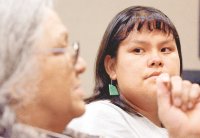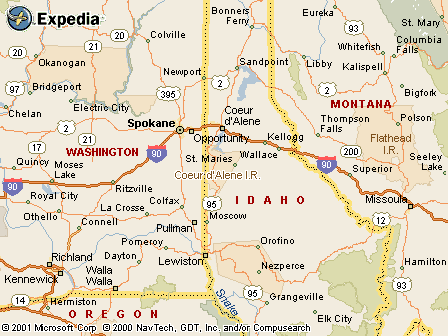|
|
Canku Ota |
|
|
(Many Paths) |
||
|
An Online Newsletter Celebrating Native America |
||
|
August 10, 2002 - Issue 67 |
||
|
|
||
|
History Too Important to Let Slip Away |
||
|
by Benjamin Shors Staff
writer Spokesman-Review
|
||
|
credits:
Jesse Tinsley - The Spokesman-Review Patrina Cox, right, of the Spokane
Tribe listens to tribal elder Inez Hubert talk about the difficulties
of preserving their language at a seminar in Coeur d'Alene.
|
 Coeur
d'Alene _ Once, Beatrice Miles and her husband gave away their stories
of Indian life, and authors and historians from across the country carried
them away. Coeur
d'Alene _ Once, Beatrice Miles and her husband gave away their stories
of Indian life, and authors and historians from across the country carried
them away.
But the interviews sometimes took hours and eventually the couple began charging for the stories. At her last sitting with historians three years ago, Miles charged $200. "They were surprised," said the 86-year-old Miles, one of the oldest members of Idaho's Nez Perce tribe. "In the beginning, they got the stories for free." But to members of her tribe, Miles' stories are priceless. Rather than see them auctioned off to college professors and non-Indian historians, many tribal members want stories like Miles' to be told by native writers. "History is interpreted through the eyes of the author," said Dr. Duane Hale, a historian and a Creek Indian. "People see things from a different vantage point. That's the value of native people writing their own history." Since 1983, Hale has held more than 30 workshops teaching Indian writers how to use modern tools to relay centuries-old stories. On Tuesday at the Coeur d'Alene Inn, Hale opened a three-day workshop on writing tribal histories, with 35 tribal members from seven tribes in the United States and Canada. "A lot of Indian history has been considered unimportant," said Irwin Rope, an Apache high school history teacher from San Carlos, Ariz., who attended the conference. "We're a verbal society and now a lot of our history is dying with our elders." Hale, a professor at Cisco Junior College in Cisco, Texas, has instructed members from more than 500 tribes and bands in North America, teaching them how to research and organize documents and interviews into a coherent form. Most tribal stories were passed down in oral histories, and there are huge document gaps in many tribes' pasts, Hale said. Indians weren't recognized as citizens until 1924, Hale said. And some tribes are so small they went up to 60 years without proper documentation. Hale, who has written histories for six tribes, said he has found documents stored in elevator shafts or missing altogether. Even when documents are present, they often include numbers but few insights into life on the reservations. Instead, historians are relying on personal interviews to add color to tribal histories. "Most professors have dealt with the documents but ignored the people," Hale said. "If you've lived through history, if it's your personal story, you need to interject yourself." Across the country, many tribes are rushing to document the stories of their elders, from tribal legends and language, to personal accounts of life on the reservations in the early 20th century. In each of the tribal members is a story, Hale said. "Once the person dies, the door is slammed," he said. Tribal elders on the Coeur d'Alene Reservation meet each week to record the conversational use of their native language, Schitsu'umsh. At the Spokane Tribe's cultural preservation office, tribal archaeologists photograph old prayer sites and document their locations. Linguists are translating stories from English into Salish, for both kids and adults. Elders hold thousands of unknown stories, said 31-year-old Patrina Cox, but it may be up to a younger generation to unlock them. For Cox, an archaeological technician with the Spokane Tribe, her job has very personal reverberations. Her grandmother, Etta "Big Mom" Adams, petitioned tribal leaders to record the elders' stories, but died before documenting her own life. "They had so many stories to be told," Cox said. "But nobody took the time to document it. It's pitiful. It's up to us to learn what we can so we can pass it along." Many are already doing that. Miles, whose grandfather fought with legendary Nez Perce Chief Joseph in 1877, now teaches tribal language and history to elementary students in Lapwai. "She's one of the very few elders who knows our history," said Mary Jane Souther, a Nez Perce domestic violence worker and part-time writer. "When we get home, we're going to sit down and develop her stories."
|
|
|
||
|
|
||
| Canku Ota is a free Newsletter celebrating Native America, its traditions and accomplishments . We do not provide subscriber or visitor names to anyone. Some articles presented in Canku Ota may contain copyright material. We have received appropriate permissions for republishing any articles. Material appearing here is distributed without profit or monetary gain to those who have expressed an interest. This is in accordance with Title 17 U.S.C. section 107. | ||
|
Canku Ota is a copyright © 2000, 2001, 2002 of Vicki Lockard and Paul Barry. |
||
 |
 |
|
|
The "Canku Ota - A Newsletter Celebrating Native America" web site and its design is the |
||
|
Copyright © 1999, 2000, 2001, 2002 of Paul C. Barry. |
||
|
All Rights Reserved. |
||
